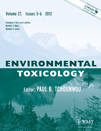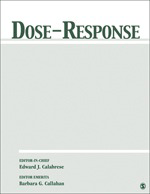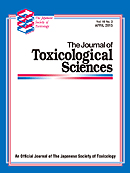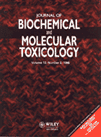
Toxins
Scope & Guideline
Exploring the intricate world of toxicology and its implications.
Introduction
Aims and Scopes
- Biochemical and Molecular Characterization of Toxins:
Research articles often delve into the detailed biochemical profiles of venoms and toxins from various organisms, including snakes, spiders, and other arthropods, elucidating their molecular structures and mechanisms of action. - Therapeutic Applications of Venoms:
The journal highlights studies that explore the potential of venom-derived compounds as therapeutic agents, including their anti-cancer, analgesic, and neuroprotective properties. - Pathophysiological Mechanisms of Toxicity:
Many published works focus on the mechanisms by which toxins induce physiological damage, including studies on inflammation, oxidative stress, and kidney injury related to venom exposure. - Venomics and Proteomics:
The journal emphasizes modern proteomic and genomic techniques for the analysis of venoms, fostering a deeper understanding of toxin diversity and their evolutionary significance. - Environmental and Ecological Aspects of Toxins:
Articles also cover the ecological roles of toxins in predator-prey interactions and their impact on biodiversity, providing insights into the evolutionary adaptations of venomous species.
Trending and Emerging
- Immunomodulatory Effects of Toxins:
Recent publications have increasingly focused on the immunomodulatory properties of various venoms, exploring how these compounds can influence immune responses, particularly in the context of diseases like rheumatoid arthritis. - Bioprospecting for Anti-Cancer Molecules:
There is a growing interest in using venoms for bioprospecting, particularly for identifying compounds with potential anti-cancer properties, as evidenced by studies targeting glioblastoma and other malignancies. - Neuroprotective Properties of Venoms:
Emerging research highlights the neuroprotective effects of specific toxins, with studies investigating how these compounds may mitigate neurodegenerative conditions and provide insights into new therapeutic avenues. - Advanced Methodologies in Toxin Research:
The use of advanced techniques such as high-performance liquid chromatography (HPLC), proteomics, and transcriptomics is on the rise, allowing for a more detailed analysis of venom composition and function. - Environmental Impact of Venomous Species:
There is an increasing recognition of the ecological implications of venomous species and their role in ecosystems, with more studies focusing on the environmental factors influencing venom composition and toxicity.
Declining or Waning
- Traditional Antivenom Development:
There has been a marked decrease in publications focused solely on traditional antivenom development, as the field shifts towards exploring more novel therapeutic approaches and biopharmaceuticals derived from venom. - General Toxicological Reviews:
The journal has seen a reduction in broad toxicological reviews that do not focus on specific toxins or venoms, indicating a shift towards more specialized and detailed studies. - Basic Toxicology Studies:
Research that focuses solely on basic toxicology without the context of venom or toxin application in medicine is becoming less prominent, as the field increasingly emphasizes applied research with clinical implications.
Similar Journals

Antioxidants
Connecting researchers to the world of antioxidants.Antioxidants is a premier open-access journal published by MDPI that has been actively contributing to the field of antioxidant research since its inception in 2012. Based in Switzerland, the journal holds a noteworthy impact factor indicative of its scholarly influence, particularly given its high rankings in various categories. As of 2023, it proudly sits in the Q1 quartile in Biochemistry, Clinical Biochemistry, Food Science, and Physiology, solidifying its status as a critical resource for innovative studies. With a strong focus on the roles of antioxidants across multiple disciplines—ranging from molecular biology to food science—this journal serves as a vital platform for researchers, professionals, and students aiming to advance knowledge in mitigating oxidative stress and enhancing health through dietary and therapeutic approaches. The open-access model guarantees wide accessibility, allowing for the dissemination of significant research findings globally, making it indispensable for anyone engaged in modern biochemical and physiological studies.

ENVIRONMENTAL TOXICOLOGY
Illuminating the Path to Safer EcosystemsENVIRONMENTAL TOXICOLOGY, published by Wiley, is a premier academic journal dedicated to the multifaceted study of toxic substances in the environment and their effects on human health and ecosystems. With the ISSN 1520-4081 and E-ISSN 1522-7278, this journal holds a prestigious position in the field, being ranked in the Q1 category across various relevant disciplines, including Health, Toxicology and Mutagenesis, and Management, Monitoring, Policy and Law. The journal regularly publishes high-quality research articles, reviews, and policy discussions aimed at understanding the implications of environmental toxins from 1980 to the present, contributing to the body of knowledge critical for the safety and sustainability of our environment. Researchers and professionals will find a treasure trove of information that not only highlights current trends and methodologies but also sets the stage for future advancements in toxicology. As a key resource, it provides valuable insights necessary for policy-making, environmental management, and public health, reinforcing its significance in the ever-evolving fields of toxicology and environmental science.

Dose-Response
Bridging Knowledge Gaps in Dose-Response AnalysisWelcome to Dose-Response, a premier open-access journal published by SAGE Publications Inc., dedicated to advancing the understanding of dose-response relationships in chemical exposure, health, toxicology, and public health. Established in 2003, this journal has quickly become an invaluable resource for researchers and professionals in the fields of public health, environmental science, and toxicology, boasting a commendable impact factor and a notable ranking in multiple categories, including Q2 in Public Health and Environmental and Occupational Health. With its converged years stretching from 2008 to 2024, Dose-Response aims to publish high-quality articles that contribute to the evaluation of health risks and benefits, ensuring that essential research reaches a global audience. Its open-access model provides unrestricted access to groundbreaking studies, fostering collaborative efforts among scientists and practitioners to inform policy and improve public health outcomes.

ARCHIVES OF TOXICOLOGY
Leading the Charge in Toxicology InnovationARCHIVES OF TOXICOLOGY is a prestigious journal published by Springer Heidelberg, dedicated to advancing research in the field of toxicology and related disciplines. With a distinguished history dating back to 1930, this journal has continuously provided vital insights and groundbreaking studies, making it a cornerstone in the areas of health, toxicology, and medicine. Recognized for its high impact, it occupies a top-ranking position in Scopus, with remarkable quartile placements in 2023, categorizing it as Q1 in Health, Toxicology and Mutagenesis, and Q1 in Medicine (Miscellaneous). The journal highlights critical research and innovative methodologies, appealing to a diverse audience of researchers, professionals, and students committed to understanding the complexities of toxic substances and their implications for public health and environmental safety. The journal does not currently offer open access, allowing for a more traditional but rigorous peer-review process that ensures the quality and integrity of every published article. Join the global discourse in toxicological science with ARCHIVES OF TOXICOLOGY, where every contribution furthers the understanding of safety and toxicity in our world.

JOURNAL OF TOXICOLOGICAL SCIENCES
Exploring the Complexities of Toxic SubstancesThe Journal of Toxicological Sciences, published by the Japanese Society of Toxicological Sciences, is a prominent academic journal dedicated to the comprehensive study of toxicology and its related fields. Since its inception in 1976, the journal has provided a vital platform for researchers and professionals to disseminate innovative findings and insights in toxicology, with a focus on both experimental and clinical studies. Positioned in the Q3 quartile across various relevant categories, including Medicine (miscellaneous) and Toxicology as of 2023, the journal plays an essential role in advancing our understanding of toxic substances and their effects on biological systems. Although currently not open access, the journal maintains high academic standards and is indexed in Scopus, ranking #96 in Toxicology. Offering unique perspectives from Japan, it encourages global collaboration and discourse among toxicologists, making it an invaluable resource for students, researchers, and industry professionals alike.

Toxicon-X
Pioneering Research for Environmental and Human HealthToxicon-X is a prestigious journal published by ELSEVIER, specializing in the dynamic field of toxicology. With an impact factor indicative of its excellence and rigor—ranked Q1 in Toxicology as of 2023, and positioned at #40 out of 133 in Scopus's Pharmacology, Toxicology, and Pharmaceutics category—this journal is a vital resource for researchers, practitioners, and students alike. Since its inception in 2019, Toxicon-X has embraced an Open Access model, enhancing accessibility and transparency of research findings. This ensures that crucial studies on toxic agents and their effects reach a broader audience, driving advancements in public health and safety. The journal is based in the United Kingdom and caters to a diverse international readership, with its scope encompassing novel research, reviews, and insights into emerging toxicological challenges. As we move towards the 2024 convergence year, Toxicon-X remains committed to fostering a deeper understanding of toxic substances, their mechanisms, and implications for human and environmental health.

JOURNAL OF APPLIED TOXICOLOGY
Connecting Researchers to the Future of ToxicologyJOURNAL OF APPLIED TOXICOLOGY, published by Wiley, stands as a leading platform in the field of toxicology, focusing on the rigorous examination of chemical substances and their effects on biological systems. With an impressive Impact Factor, it ranks in the top quartile (Q2) for toxicology journals, reflecting its esteemed position within the scientific community. The journal, identifiable by its ISSN 0260-437X and E-ISSN 1099-1263, has been an invaluable resource since its inception in 1981, and it continues to serve as a conduit for innovative research and practical applications through 2024. Positioned at the forefront of the field, it garners recognition in the Scopus Rankings, where it ranks #31 out of 133 journals in the toxicology category, placing it in the 77th percentile—a testament to its contribution to the advancement of pharmacology and toxicological sciences. While not an open-access journal, it remains accessible to a wide audience of researchers, professionals, and students eager to explore cutting-edge findings in applied toxicology, making it a pivotal resource for enhancing knowledge and fostering collaboration in the field.

JOURNAL OF BIOCHEMICAL AND MOLECULAR TOXICOLOGY
Unraveling the Complexities of Molecular ToxicologyJournal of Biochemical and Molecular Toxicology, published by Wiley, plays a pivotal role in the advancement of knowledge within the fields of biochemistry, toxicology, and molecular biology. Established in 1998, this esteemed journal has garnered a significant reputation, evidenced by its current placement in the Q2 quartile across several categories, including Biochemistry, Health, Toxicology and Mutagenesis, and Medicine. With an ISSN of 1095-6670 and an E-ISSN of 1099-0461, it serves an international audience, offering critical insights and innovative research that shape our understanding of biochemical interactions and toxicological assessments. While it does not operate on an open-access model, the journal ensures rigorous peer review and high-quality publication standards, making it a valuable resource for researchers, professionals, and students dedicated to the exploration of molecular toxicology. The journal's recognized impact within the scientific community is reflected in its competitive rankings among specialized journals, fostering significant contributions to both academic and applied contexts.

Journal of Environmental Science and Health Part C-Toxicology and Carcinogenesis
Diving Deep into Toxicology and Cancer ResearchThe Journal of Environmental Science and Health Part C-Toxicology and Carcinogenesis is a vital publication in the fields of environmental science, toxicology, and cancer research, published by Taylor & Francis Inc. With an ISSN of 2689-6583 and E-ISSN 2689-6591, this journal provides a platform for peer-reviewed research that explores the intersection of environmental factors and health outcomes, particularly focusing on toxicological and carcinogenic impacts. Though it does not currently offer Open Access, it remains a significant contributor to academia with its current ranking in the Q4 category for Cancer Research and Q3 in Health, Toxicology and Mutagenesis. The journal has converged from 2020 to 2024 and aims to disseminate pioneering studies that inform public health policies and foster a deeper understanding of environmental toxins. Aspiring researchers, professionals, and students will find this journal to be an essential resource for the latest findings and discussions within these critical fields.

TOXICOLOGY
Elevating research in toxicology to safeguard public health.TOXICOLOGY, published by Elsevier Ireland Ltd, is a prestigious peer-reviewed journal specializing in the field of toxicology. With an ISSN of 0300-483X and an E-ISSN of 1879-3185, this journal provides a vital platform for researchers, professionals, and students to disseminate and access groundbreaking studies from 1973 to present, with a convergence set until 2024. Recognized for its high impact, it holds a Q1 ranking in Toxicology category and ranks #18 out of 133 in Scopus's sector of Pharmacology, Toxicology, and Pharmaceutics, placing it in the 86th percentile. While the journal is not open access, it nonetheless offers a rich collection of research articles that enhance the understanding of toxicological science and its applications. The journal's objectives encompass advancing knowledge in the toxicological evaluation of substances, promoting safety in public health, and fostering dialogue among scholars. As a key resource in the field, TOXICOLOGY plays a crucial role in advancing research and informing practices related to toxicological risks and safety assessments.